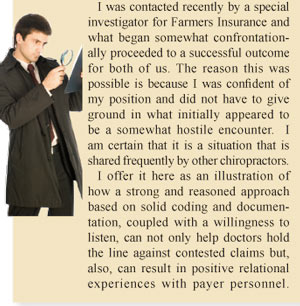Investigator: I would like to meet with you to discuss a patient.
Dr. Nohava: I do not meet with investigators or lawyers and I would prefer to have all requests submitted on paper. Any and all medical information pertaining to the patient is located within his/her medical record.
Investigator: You know, I could make you write a narrative report that could take you four hours. I only want to meet with you for fifteen minutes.
Dr. Nohava: I’m not interested in meeting but, if you have some questions, I may be able to answer them over the phone. How can I help you?
Investigator: Well, first of all, why did you take X-rays on this patient when she already had a set of X-rays.

Dr. Nohava: The X-rays taken immediately following her motor vehicle collision were taken while she was on a stretcher lying on her back in the emergency room. Those X-rays were nonweight-bearing or recumbent. I only take X-rays in a weight-bearing or standing position so that I can see the body in its normal position while standing versus a nonweight-bearing position.
Investigator: Oh. (Pause.) I have a question as to why your visits are $200 per visit when you are only performing the therapy codes for around five minutes each.
Dr. Nohava: If you look at the HCFA 1500 claim form, you will notice that I properly documented the care being given to the patient. If you look closely following the CPT codes, you will notice a 52 and 59 modifier being used to indicate a separate and distinct procedure as well as a reduced amount of time procedure.
Investigator: I feel that $50 for each therapy is too expensive and I am wondering why you did not reduce those fees.
Dr Nohava: My documentation indicates exactly what was performed on the patient and, moreover, it is not my job to reduce fees. I only charge for and document the services that I perform.
Investigator: Would you be okay with my reducing those services from their full price?
Dr. Nohava: I am quite surprised that most personal injury insurance companies do not reduce their payments for reduced services. In my experience, all major medical insurance plans and workers compensation plans apply payment reductions in accordance with the documentation.
Investigator: Then you are okay with that reduction in fees?
Dr. Nohava: Yes, I believe that it is fair. If I do not perform the therapy for the allotted amount of time, I fully expect the fee to be reduced on a basis of the reduced service.
The conversation had begun with a degree of awkwardness and potentially argumentative attitudes, but it ended with respect for each other’s positions. I indicated to the investigator that my job is to do the best that I possibly can to help my patients, and that I document exactly what I perform. I also told him that, if he needed to look further at my medical records or documentation, he could feel free to do so at any time.
The investigator seemed amazed that I would take the reduction. He concluded by saying that his company should send more of their clients in my direction. This was a successful encounter that was based on confidence in my coding and documentation procedures.
Stephen P. Nohava is a graduate of Northwestern College of Chiropractic and operates a successful practice in Shoreview, Minnesota, a Minneapolis-St. Paul exurb. He is a consulting client of the ACOM Healthcare Consulting Group, a relationship that he credits with strengthening both his practice and his resolve in maintaining his professional position under challenge. Dr. Nohava can be reached by email at [email protected].
